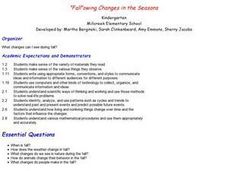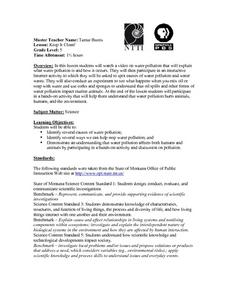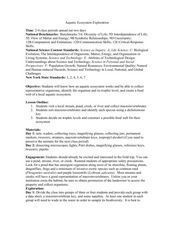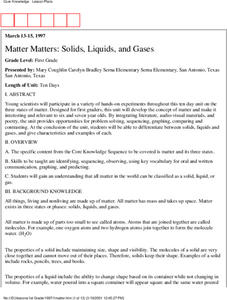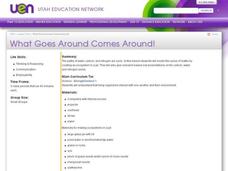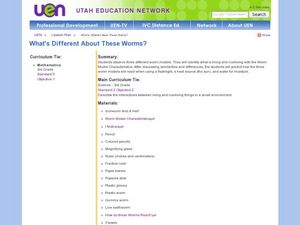Curated OER
Prairies
Students identify the basic characteristics of the prairie ecosystem, and several commonly known prairie species. They create a classroom mural of a prairie ecosystem; and create reports about what they have found out.
Curated OER
How Do We Make Wise Decisions In Our World?
Third graders participate in a case study and use their problem solving skills to address the solution to a given situation. They consider how to survive in a foreign country, make economic decisions, and determine wise decisions for...
Curated OER
"Fall"owing Changes in the Season
Students create a whole class A-B-"C"eason Book. Each student is responsible for creating a "letter" page relating to changes, adaptations, or other fall concepts. After hard copies of the class ABC books are created, the teachers using...
Curated OER
Where Have All the Endangered Gone?
Students explore animals that are endangered. They choose an endangered animal that they would like to keep from becoming extinct. Students create a persuasive presentation to persuade someone to understand why they feel keeping their...
Curated OER
Exploring Ecosystems
Fourth graders create an ecosystem as a class. They have already produced smaller ones. They use a pond or something similar on school grounds to meet the needs of certain plants and animals of their ecosystem. Specifically created will...
Curated OER
Great Salt Lake
Fourth graders make an ecosystem that brine shrimp can live in and take data as to what level of salinity the water is, how cold it is, and other data that students may think is important. They also hypothesize and predict the outcomes...
Curated OER
The Ant Attack
Third graders observe the daily activity of an ant farm. Through observations and journal writing, they gather data concerning the daily activities of the ants. Students use their observations to predict the effect of environmental...
Curated OER
What is Biology?
In this biology learning exercise, students review the characteristics of life and the scientific method. This learning exercise has 19 fill in the blank, 6 matching, and 2 short answer questions.
Curated OER
My Spelling Words: Spelling List #169
In this spelling learning exercise, students read and write twelve spelling words. Afterward, they solve a crossword puzzle using the words. All words are related to the ecosystem and endangered animals.
Curated OER
Student Exploration: Pond Ecosystem
In this student exploration-pond ecosystem worksheet, students use the Pond Ecosystem Gizmo to measure oxygen concentrations and temperature and record the data on charts.
Curated OER
Organisms and Their Environment
Students observe elements of a local ecosystem and gain an understanding of what elements make up an ecosystem. In this ecosystem lesson plan students create a class food web that shows the interactions among the elements of the...
Curated OER
The Wonderful World of Slugs
Examine a slug? Of course, what else would a 2nd grader do with it? Pupils use clues and go on a slug hunt, read a slug story, or make a cooperative group mural of a slug's habitat. While older learners catalog slugs, go on a slug hunt,...
Curated OER
Keep It Clean!
Fifth graders investigate the how water becomes polluted and how it effects the environment, animals, and humans. They watch a video and conduct experiments.
Curated OER
Aquatic Ecosystem Exploration
Students visit a local stream, pond, creek, or river and collect macroinvertebrates. They sort macroinvertebrates and identify each species using a dichotomous key. Students decide on trophic levels and construct a possible food web for...
Curated OER
Runoff: Intro to Watersheds
Learners are taught that a watershed is, what types of basic land cover are impermeable and permeable to water. They trace the flow of water around their school and around their home. Students determine what watershed their school is a...
Curated OER
Algae Part One: An Introduction
Students have the opportunity to view two types of algae under 400x magnification with a compound microscope. They make observations and record their observations through drawings and words. In addition, they identify different qualities...
Curated OER
Ecosystems: A Home By Any Other Name
Students can learn more about the parts of ecosystems through exploration and hands on activities.
Curated OER
Developing Environmental Awareness Through Problem Solving
Young scholars examine the relationships among living and non-living parts of the environment. Using their senses, they identify the objects in their classroom. In groups, they participate in experiments to discover where electricity...
Curated OER
Cold and Warm Blooded Animals
Students research facts about a cold or warm-blooded animal in order to designa report either as PowerPoint or word processed document. They use online resources and insert images in to the report. They include the specified criteria and...
Curated OER
Vermicomposting
Third graders study vermicomposting. In this vermicomposting lesson, 3rd graders prepare to begin a unit on decomposition by constructing a worm bin. Students collect worms to be used later in experiments.
Curated OER
Matter Matters: Solids, Liquids and Gases
Scientists participate in a variety of hands-on experiments in this ten-day unit on the three states of matter. Lessons incorporate literature, a-v materials, and poetry to help students differentiate between solids, liquids and gases.
Curated OER
What Goes Around Comes Around!
Students create an ecosystem in a jar to show a model of the water, carbon, and nitrogen cycle. Working in small groups, they research and present orally the information they find on this cycle.
Curated OER
Where are the Dinosaurs?
Students understand what it means when an animal is extinct. In this dinosaur lesson, students create dinosaur dioramas showing their habitat and what in their environment might make them become extinct. students pay particular attention...
Curated OER
Three Worm Lesson
Third graders observe properties of three worms. In this living and non-living lesson, 3rd graders study characteristics of living and non-living worms. Students experiment to find how light, heat and moisture effects each of the worms....
Other popular searches
- Living and Nonliving Things
- Living vs Nonliving Things
- Living or Nonliving Things
- Living Nonliving Things
- Living/nonliving Things




